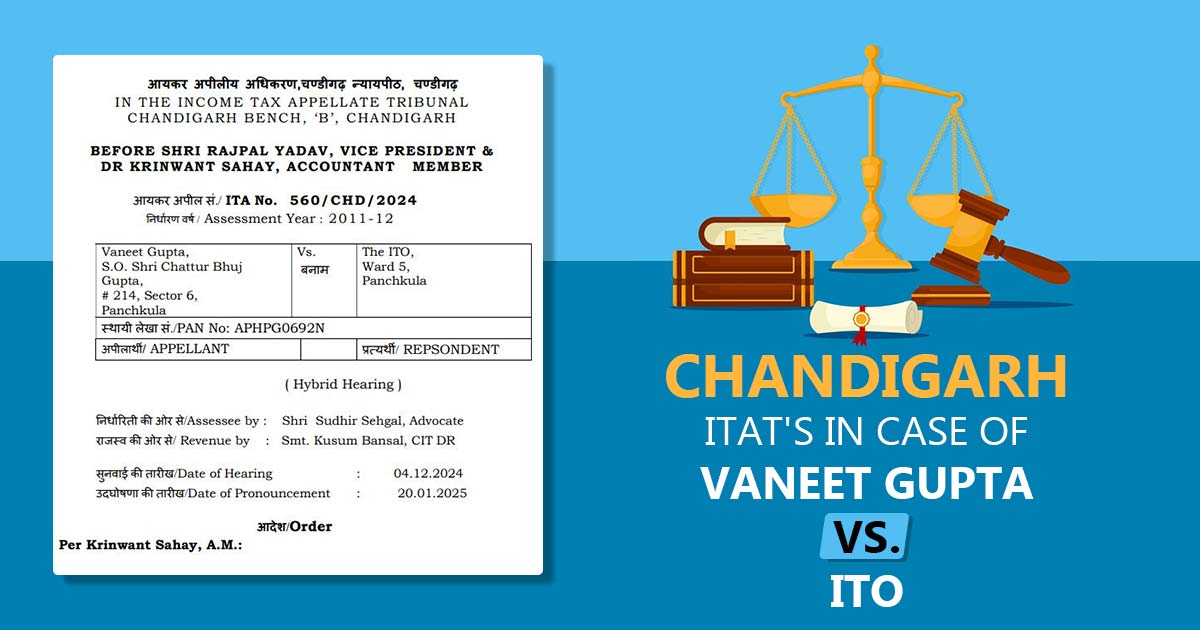
The Chandigarh bench of the Income Tax Appellate Tribunal (ITAT), Section 263 of the Income Tax Act, 1961, which authorizes the Principal Commissioner of Income Tax (PCIT) to modify assessments, cannot be invoked based on an audit objection. The taxpayer Vaneet Gupta, in March 2018, was provided an income tax notice under section 148 asking for Rs 1.1 crore investment in a property and Rs 43.2 lakh cash deposits in a joint bank account.
In answer, he elaborated that the property belonged to his wife and was transferred to him through sale, with the payment filed at that time. He mentioned that the joint bank account with his wife has been computed before in the related assessment year. An audit objection sought concerns in March 2019 for the failure of the assessing officer to analyze the bank deposits of the taxpayer, though the AO validated to the Commissioner (Audit) that they were duly examined.
PCIT in 2021 issued a section 263 notice for the non-examination of the bank account and passed an ex parte order due to the absence of the taxpayer. The taxpayer moved to the ITAT claiming Covid-19 as a reason for the absence therefore, the tribunal remanded the matter to the PCIT. PCIT in January 2022 furnished a fresh section 263 notice, and the taxpayer furnished the needed information.
PCIT in February 2022 has furnished another notice u/s 263, and in this time it raises other problems apart from the bank account, thereby expanding the extent of proceedings.
Sudhir Sehgal, counsel for the applicant, asserted that the Section 263 notice, issued exclusively on an audit objection, does not have the independent application of mind by the PCIT. Referring to Ganga Plywood Ltd. vs. PCIT (2021) and similar cases, he held that these notices are not valid without the independent satisfaction of the authority.
The counsel underscored that ITAT had remanded the case to PCIT for a precise issue; therefore, PCIT cannot expand its extent by introducing new issues. He said that the statutory two-year limitation for issuing a Section 263 notice had already expired before the fresh notice dated February 2022, making the order of PCIT unsustainable.
The counsel of the department, Kusum Bansal, kept the order of PCIT under section 263 and claimed that the PCIT was right to raise new problems in the new notice. The counsel expressed that the original assessment did not engage an appropriate inquiry, claiming that the AO didn’t assess accurately.
The tribunal, led by Rajpal Yadav (Vice President) and Dr. Krinwant Sahay (Accountant Member), after hearing both sides, acknowledged that the AO thoroughly analyzed all the transactions in the assessment and that the taxpayer furnished all the required data of the deposits. PCIT’s second notice, which raised the new problems, was beyond the two-year limitation for commencing proceedings, making it invalid.
| Case Title | Vaneet Gupta Vs. The ITO |
| Citation | ITA No. 560/CHD /2024 |
| Date | 20.01.2025 |
| Counsel For Appellant | Shri Sudhir Sehgal, Advocate |
| Counsel For Respondent | Smt. Kusum Bansal, CIT DR |
| Chandigarh ITAT | Read Order |









